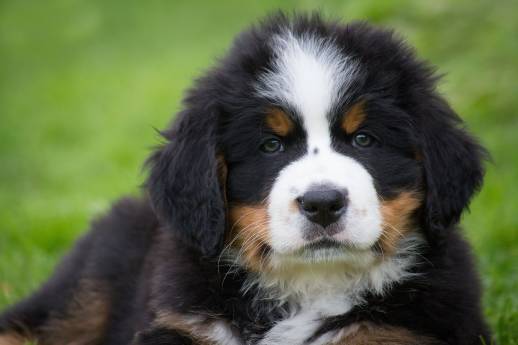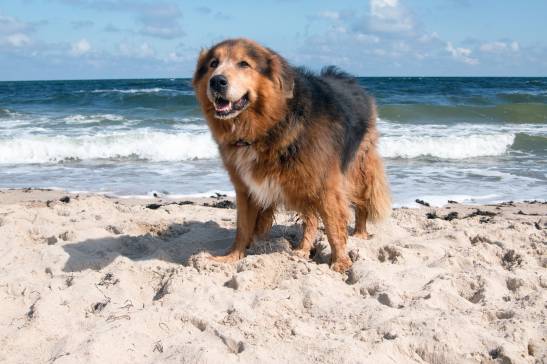Are you interested in adopting a Bernese Mountain Dog? If so, you’re not alone. These beautiful dogs have become one of the most popular for families in the US and around the world.
Connect with a verified veterinarian in minutes. Licensed vets are available 24/7 to answer your questions. No need to worry about your furry family member.
In this guide, we’ve put together information to help you learn more about this wonderful dog breed including where these dogs originally come from, what they were bred to do, how to care for them, and more. Let’s get started!
What is a Bernese Mountain Dog?
The Bernese Mountain Dog was originally bred in the Swiss Alps. As you can imagine, these dogs were a favorite of shepherds who used the dogs to help with herding sheep and cattle. It’s thought that this breed was one of four breeds of Sennenhund dogs, originally bred from crosses between different farm dog breeds and Molosser (mastiff-type dogs used by the Romans) as far back as the first century BC. The Sennehund breeds were used by herders and dairymen to help with cattle and sheep.
From these four mountain dog breeds, the Bernese Mountain dog has come to us. They’re considered an “all-purpose” farm dog, due to their large size and for being strong and having an even temperament. They were even used to pull small carts. In fact, the Bernese Mountain Dogs (also called Berners), were even used to help dairymen pull carts of milk and cheese, which led to the dogs being nicknamed “Cheese Dogs” by the locals.
Berners were first transported to the US back in 1926 by a Kansas farmer, and from there, these big, beautiful dogs have been a favorite ever since.
Bernese Mountain Dog Characteristics
Berners are famous for their beautiful, tricolor coats and the white “Swiss Cross” found on their chest. Bernese Mountain Dogs have a distinctive coat that’s tan, black and white. Their coats are long and silky, with a long outer coat and a wooly undercoat (that keeps the dogs warm in colder temperatures). Berners do shed quiet a bit all year round, but especially in the Spring and Fall.
These dogs have a head that’s oval-shaped, with dark brown eyes that resemble melting dark chocolate. They also sport floppy ears and generally have the look of a gentle giant. Berners also have a strong muzzle that’s straight, with a black nose.
Keep in mind these are large dogs—any dog that can pull a small cart in the mountains will be large! Berners usually weigh between 70-110 lbs and stand between 26 to 27.5 inches tall. Males are larger than the females, and these dogs generally reach adult size by the time they’re about 15 months old. These lovely dogs have an average lifespan that ranges from 7 to 10 years.

Review symptoms, medications & behavior to keep your pets healthy with a Vet Online in just minutes.
Ask a Vet Live NowBernese Mountain Dog Temperament
When it comes to their temperament, Berners are famous for being affectionate, loyal, highly intelligent and eager to please their pet parents. One thing to know about this breed is that a Bernese Mountain Dog may become attached to one person in the family.
Speaking of the family, a Berner will be a great addition to almost any family, even those that have young children. The dogs are calm, but friendly and are also known for being a bit on the silly side from time to time.
Berners are best for families who have a home with a large yard; they’re really not meant for apartment living. They also need to live with the family, rather than staying outdoors alone. Expect that your Bernese Mountain Dog will soon become a part of most of your family’s activities!
Be prepared, because while Berners are gentle, they do have quite a lot of energy. Remember, these are working dogs, so they will need regular exercise to wear off all that energy.
While Berners are quick to please, they can be a handful to train, especially if you have a puppy. Berners mature more slowly than other breeds, and stay in the puppy phase longer, too. These dogs are known for their sensitive spirits, so you’ll need to have a firm hand, but use plenty of positive reinforcement. And because of their large size and playfulness, you’ll need to make sure your dog is socialized properly. These dogs are like large puppies and may not always realize their strength or size when playing with you and your kids.
Bernese Mountain Dog Health Issues
Berners are subject to several health issues. Some of these have come about due poor breeding. Some of the health issues these lovable giants are prone to include:
- Cancer
- Hip dysplasia
- Elbow dysplasia
- Progressive retinal atrophy
- Portosystemic shunt
- Von Willebrand’s Disease
- Panosteitis
- Gastric Torsion
These dogs really don’t do well in an apartment or condo. Instead, they’re better suited to a home with a large fenced yard. There the Berner can play and get the exercise he needs to wear off all that energy. Your Berner will need at least 30 minutes of vigorous exercise each day, and more in order to stay in shape.
In addition, Berners are a better option if you live in a colder climate. They’ll love the snow! On the other hand, a Berner doesn’t take the heat well, and is prone to heat stroke due to his heavy fur. If you live in a warmer area, be sure to take your Berner out when the temperatures are coolest, such as early in the morning or late in the evening. Your dog will also need to be in a place that’s air conditioned, or at least provided with fans to keep him cool.
One note about Bernese Mountain Dog puppies. They tend to grow very fast from the time they reach 4 months of age up to 7 months old. For this reason, they’re prone to certain bone injuries and disorders. Your puppy will need a high quality, low calorie diet to keep him from growing too fast.
And Berner puppies should not be allowed to run or play on hard surfaces, jump or pull loads that are heavy. They shouldn’t be used to pull any type of load until they’re over 2 years old, when their joints will be strong and have finished growing.
Feeding & Grooming
Your Bernese Mountain Dog’s diet should be made especially for dogs that are high energy and need a lot of exercise.
When it comes to grooming, your Berner dog will need to be brushed at least once a week. This is because they shed all year round; brushing on a regular basis will keep your dog’s hair smooth and tangle-free. Plus, with regular brushing, you can keep shedding and vacuuming down a bit!
Bernese Mountain Dogs can make a wonderful addition to your family! Just be have a fenced yard and be ready to give your fur baby plenty of exercise!
Connect with a verified veterinarian in minutes. Licensed vets are available 24/7 to answer your questions. No need to worry about your furry family member.

Kyoko
Kyoko is from a family of 3 and moved to New York with her parents and siblings when she was 13. Kyoko is fond of spending a great amount of time with pets, specifically her beagle Luna and cat Missy. Her boyfriend often complains that she spends too much time giving attention to their animals. Kyoko has written dozens of articles concerning pets and is aiming at owning a pet shop one day!
Review symptoms, medications & behavior to keep your pets healthy with a Vet Online in just minutes.
Ask a Vet Live Now



